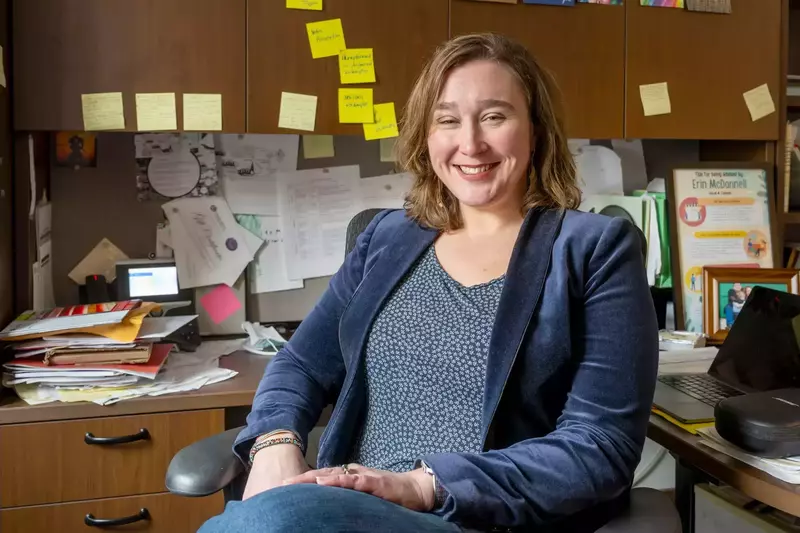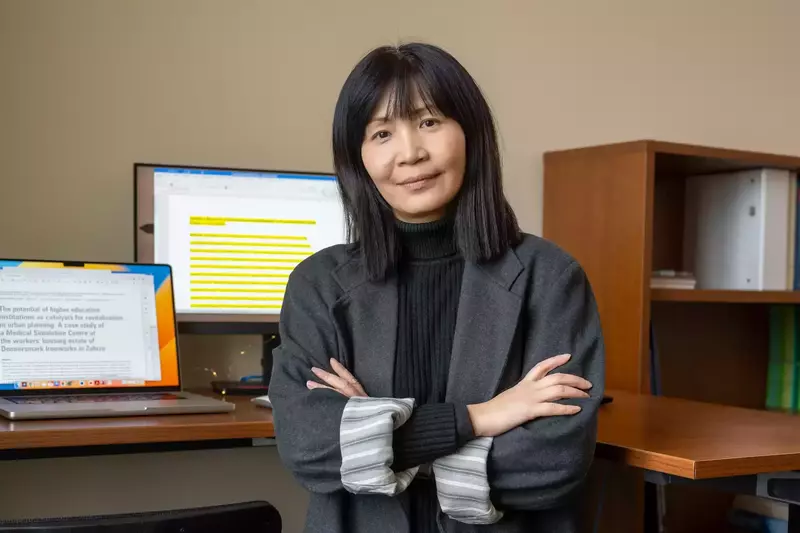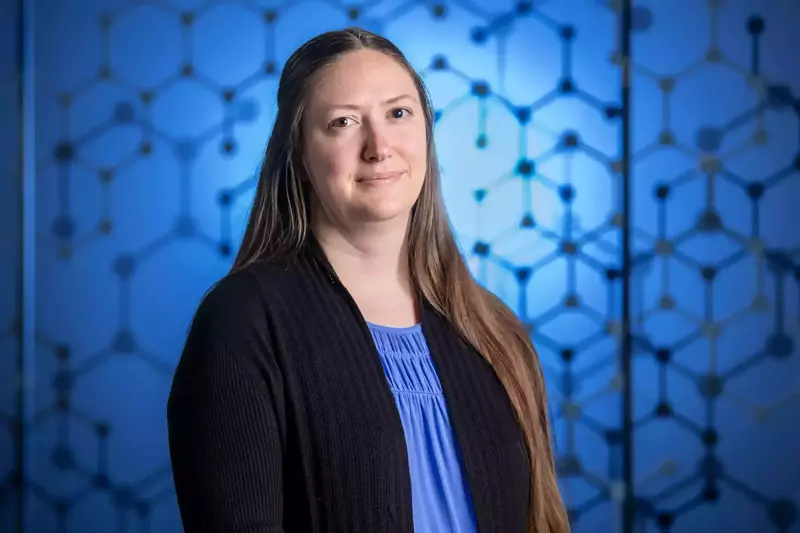Erin McDonnell sees those who fight against the odds.
The University of Notre Dame sociologist works with public sector employees in low-income nations who face uphill battles against bureaucratic procedures and cultural stigmas that inhibit their work.
But instead of focusing on what’s going wrong, McDonnell emphasizes what’s going right.
“I like to make things better,” she said. “Incremental improvement is my jam.”
McDonnell, the Notre Dame du Lac and Kellogg Associate Professor in the Department of Sociology, interviews, observes, and guides those who are trying to improve their situations—whether it’s a mediator in Ghana helping citizens navigate a complicated judicial system or female managers in the West African country’s water sector. She shares their successes and what can be learned from them in journal articles, in her award-winning book, and through public policy platforms such as the World Bank.
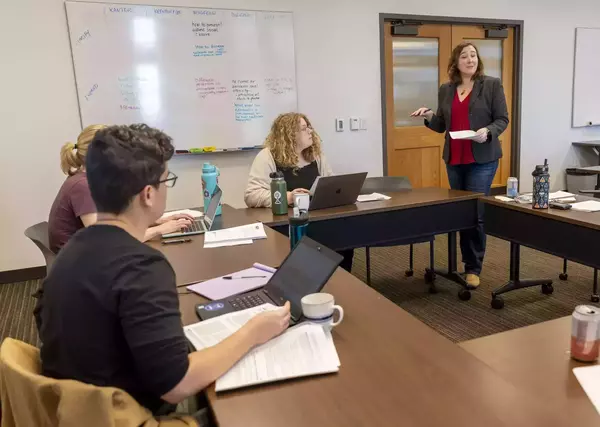
McDonnell takes a similar approach to mentoring students, guiding undergraduates as they discover their passion for research and their potential to conduct it independently and internationally, or helping graduate students find their voice in crafting proposals or developing their dissertations.
“In both cases, part of my message is to say, ‘Some of what you’re doing is better than you realize it is already, and if we shine it up a little, you can really see what you’re doing more clearly and grow that,’” she said.“It’s not all perfect, and that’s OK, but we can move in a growth direction.”
Identifying inspiration
As a doctoral student at Northwestern University, McDonnell discovered there were many misconceptions about what efficiency and effectiveness looked like in the public sector of low-income nations. For decades, McDonnell said, sociologists had applied Westernized conditions to cultures where those circumstances were not appropriate or evident.
She aimed to do better.
“We could improve knowledge of the social world if we took seriously and better understood the experiences of people living in lower-income countries,” she said.
McDonnell, who has concurrent appointments in the Department of Africana Studies and Keough School of Global Affairs, focuses her recent research on public administration, motivation, and organizational culture. Through analyzing training programs for local government workers and studying how to make them more effective, she hopes to help make the successes she’s pinpointed become more common.
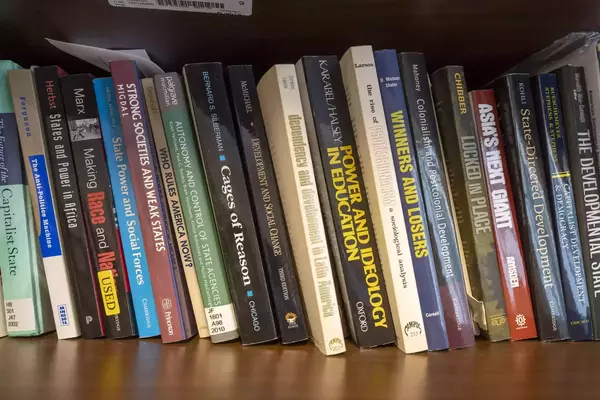
In her 2020 book, Patchwork Leviathan: Pockets of Bureaucratic Effectiveness in Developing States, which won the European Group for Organizational Studies Book Award, McDonnell expanded her scope beyond Ghana. By identifying high-functioning areas of local governments in China, Brazil, Kenya, and Nigeria, she provided a fresh perspective on the keys to successful statecraft.
“We need to see and honor the work of the people—the public servants around the world—who are standing in that gap, who are trying against impossible odds to make it work because they believe in the state and they believe in the public goods that their community needs,” she said. “Those are the things that keep me inspired in this work.”
Fellowship of women
Often, McDonnell is the first to credit employees for their efforts when they go unseen.
During her recent work with Ghanaian court mediators, who help undereducated citizens navigate a complicated judicial system, she learned they had gone unpaid for more than a year. When McDonnell asked one woman why she continued her work, she replied, “If I don’t come, there’s no one else who will do this.”
And while studying a training program for public sector water workers, McDonnell grew close to a number of the women in the program. With a group of female managers, she bonded over shared experiences of navigating leadership roles as a woman.
“There is something amazing that comes from traveling and recognizing that there are commonalities to women’s experiences all around the world”
“Salo, Roni, and Peace are all these brilliant women dedicated to their organization and trying to help the people of Ghana,” she said. “But women around the world face surprisingly similar day-to-day challenges working in male-dominated contexts, even though there are culturally specific differences.”
McDonnell also made a personal connection with another water worker, Josephine Quaye-Senazah—a bond she described as a “sisterhood”—after finding uncanny parallels in their foundational life experiences across two continents.
“There is something amazing that comes from traveling and recognizing that there are commonalities to women’s experiences all around the world,” she said. “There are important differences, and we need to support and honor each other in those differences, but there’s a joyfulness that women can find in fellowship with other women.”
Unseen impact
McDonnell also brings her drive of incremental empowerment to the classroom by implementing what she calls the “shine it up and hand it back” method. She takes students’ evolving ideas and brings them into greater focus, while remaining authentic to their interests.
Through the Kellogg Institute, she teaches a course designed to prepare undergraduates to develop and execute their own independent, international research trips. At the beginning of the class, she is frank about what to expect.
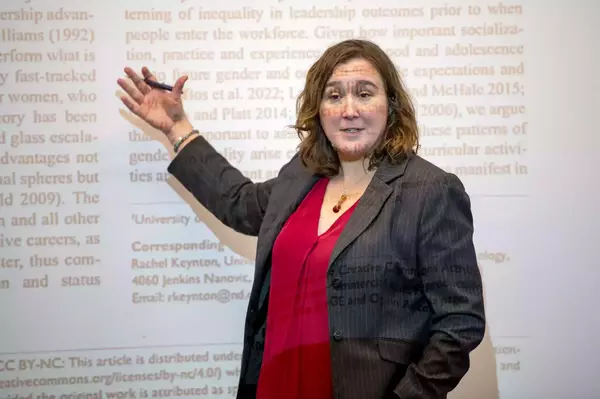
“On the first day, I tell them several things—this is the hardest class you will ever love, you are going to work your face off, and you’re going to be on an emotional roller coaster,” she said.
A key component of the course is providing a place where students can fail safely. Through adversity, McDonnell said, a door of immense learning and expertise can be opened.
What students take from that opportunity for growth can then be applied once they embark on their international research journey.
“That is actually a big step,” she said. “It is just a tremendous honor and privilege in my teaching life to accompany those students through that transformation.”
In the classroom and in the field, McDonnell thrives on focusing on the humans behind the tasks and doing what she can to help them flourish—creating a domino effect that will improve others’ lives for the better.
“It is really important to me to build people’s independent capacity,” she said, “and to help them realize continuous growth and improvement—to see challenges as opportunities and believe in themselves.”
